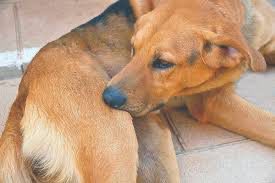Written by:
pera

1-Flea Allergy Dermatitis (FAD)
Flea allergy dermatitis is a common allergy in dogs caused by the saliva of biting fleas. It results in intense itching, scabs, hair loss, and inflammation on the dog's back, tail, and legs. Ear and skin infections may also occur.
Veterinary diagnosis involves physical exams, history inquiries, and possibly allergy testing. Left untreated, the condition can lead to severe discomfort and even life-threatening bacterial infections. Treatment focuses on flea prevention, such as using special shampoos and medication, as well as maintaining a flea-free environment. Humans can also develop allergies from fleas.
2-Environmental Allergies (Atopic Dermatitis):
Atopic dermatitis is an allergic skin condition that affects dogs and is caused by a reaction to environmental allergens like pollen, dust mites, and mold. It leads to symptoms such as itching, redness, inflammation, and skin flakiness. Diagnosis involves a physical exam, medical history, and laboratory tests.
Treatment options include allergen avoidance, topical medications, regular bathing with medicated shampoo, and oral medications. Preventive measures include minimizing exposure to allergens, maintaining good hygiene, and reducing stress. Atopic dermatitis is not contagious to humans, but both humans and dogs can have cross-reactivity to the same allergens. It can be confused with other allergies like flea allergies, contact allergies, and food allergies.
3-Food Allergies:
Food allergies in dogs can cause various symptoms such as itching, red eyes, scabbing, and coat loss. They are typically triggered by certain proteins in food that the immune system mistakenly identifies as harmful. Common allergens include dairy, beef, chicken, fish, corn, wheat, and soy. Diagnosis involves a medical history, physical examination, and possibly skin or blood tests.
Treatment includes removing the allergenic food from the dog's diet and may involve medications to reduce symptoms. Severe cases may require desensitization treatments. Prevention involves monitoring the dog's diet, maintaining good hygiene, and consulting a veterinarian for proper care. Food allergies are not contagious between dogs and humans.
They can be confused with environmental allergies or flea allergy dermatitis. Home remedies like hypoallergenic shampoo, grain-free food, and omega-3 supplements may help manage symptoms, but veterinary advice is crucial. Certain breeds are more prone to food allergies. Owners should be vigilant for signs of food allergies in these breeds. Sharing experiences with food allergies can be challenging, and support is offered for a successful recovery and a healthy life for the dog.